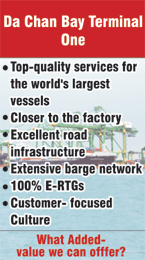|
Today's e-news sponsored by :
|
|
Powered by HKSG GROUP
|
|

|
|

|
|
The Leading Maritime & Transport News Portal
|
Saturday, August 20, 2016
|

(Click on the above banner to know more)
|
|
|
|

|
|

|
|
|
|
Freight rate enquiries from shippers
|
|
Type
|
Loading Port
|
Discharge Port
|
Cargo Type
|
Volume
|
Action
|
|
Air
|
Tallinn - Lennart Meri Tallinn Airport
|
Lagos - Murtala Muhammed Int'l Airport
|
General Cargo
|
4000 KGS / 2750 KGS
|
[
Reply
]
|
|
Sea
|
Ningbo
|
Osaka
|
General Cargo
|
FCL 1 x 20'
|
[
Reply
]
|
|
Sea
|
Haiphong
|
Nampo
|
General Cargo
|
FCL 1 x 20'
|
[
Reply
]
|
|
Sea
|
Haiphong
|
Nampo
|
General Cargo
|
FCL 1 x 40'
|
[
Reply
]
|
|
Sea
|
Miami
|
Colon
|
General Cargo
|
FCL 1 x 20'
|
[
Reply
]
|
|
|

|
|

|
|
|
|
|
Maersk to lay off 400 as it lays up 20 vessels of its 56-ship fleet
DENMARK's Maersk Supply Service has announced it will cut 20 vessels from its fleet of 56 over the next 18 months, resulting in 400 job losses.
Hundreds of maritime jobs could be at risk as part of plans by shipping giant Maersk to cut costs in the face of sluggish global demand, reports the Belfast Telegraph.
Maersk Supply Service, the shipping giant's division servicing the oil and gas sector, announced on Thursday it would cut 20 vessels from its fleet of 56 over the next 18 months, resulting in 400 job losses.
Maersk Supply Service said cuts were necessary because of limited trading opportunities and poor global demand.
"We are facing unprecedented market conditions and regrettably we have to further adjust our crew pool. It is an unfortunate but necessary step to safeguard the future of our company," said Maersk Supply Service CEO Jorn Madsen.
Parent Maersk Group last week reported an 89 per cent drop in profit in the second quarter and warned it continues to expect significantly lower full-year results.

|
|
MOL levies 2 Asia-WCSA hikes, US$750/TEU, $800/TEU September 5
JAPANESE shipping giant MOL Liner will levy two general rate increases (GRI) from September 5 on cargo from Asia to South America.
The first charge will be US$750 per TEU on cargo from Asia, which excludes Malaysia and India, and bound for Mexico and west coast of South America (WCSA).
The second charge will be $800 per TEU which will include cargo from Malaysia bound for Mexico and west coast of South America (WCSA).

|
|
HKSOA urges Hong Kong Government to aid stranded HK seamen in Oz
THE Hong Kong Shipowners Association (HKSOA) is "extremely concerned" about the welfare of the seafarers stranded aboard the Hong Kong-flagged bulker, the 181,400-dwt Five Stars Fujian, under arrest by the Australian Maritime Safety Authority (AMSA) off the Port of Gladstone, 450 kilometres north of Brisbane.
The vessel has been detained for breaches of the Maritime Labour Convention relating to lack of provisions and unpaid wages. Reports have indicated that the owner of the ship is suffering economic difficulties, and is reportedly unable to pay the crew or re-provision the ship, a HKSOA statement said.
While recognising that Hong Kong has not yet had ratification of the Maritime Labour Convention extended to it by China, the HKSOA is calling on the Hong Kong Marine Department "to provide all necessary assistance to the seafarers, who have effectively been abandoned by the owner of the ship."
The HKSOA is urging the government to immediately supply provisions and fuel to the seafarers, and to assist in the repatriation of the seafarers to their homes.
"There might not be a legal obligation for Hong Kong to provide such facilities, but there is an extremely strong moral and ethical obligation to do so," said HKSOA managing director Arthur Bowring.
"These seafarers must not be left abandoned without flag state support, especially from the world's fourth largest flag state, one that has repeatedly promoted the quality of the ships flying its twin flags," he said.

|
|
DP World net profit soars 50pc US$608 million as revenues rise 10.2pc
DUBAI global port operator DP World's first half net profit surged 50 per cent to US$608 million, drawn on revenues of $2.09 billion, an increase of 10.2 per cent year on year.
The company invested $586 million across its portfolio in the first half. "Capital expenditure in 2016 will run between $1.2 billion to $1.4 billion, with investments planned into Jebel Ali, Jebel Ali Free Zone, London Gateway, Prince Rupert, JNP Mumbai, and Yarimca [Turkey]," a company statement said.
The company said it was delaying the planned 1.5 million TEU expansion of Jebel Ali's Terminal 3 into 2017 in line with falling customer demand. It also slowed expansion of Terminal 4 due to softer market conditions.
"Our flagship port continues to operate at high levels of utilisation and we believe the medium-term outlook remains positive, particularly with the lead up to Expo 2020."
DP World said it had raised $1.2 billion in a new seven-year sukuk transaction at significantly improved terms, refinancing $1.1 billion of the existing 2017 sukuk through a tender offer and extending the debt maturity profile.
Despite a challenging trade environment, DP World's portfolio remains well-placed to continue to outperform the market.
Said DP World Group chairman and CEO Ahmed bin Sulayem: "In 2016, we have invested $586 million of capex in key growth markets, and this investment leaves us well placed to capitalise on the significant medium- to long-term growth potential of this industry."
He said the company would maintain the existing shape of its ports portfolio that has a 70 per cent exposure to origin and destination cargo and 75 per cent exposure to faster growing markets.
"The outlook for trade growth remains uncertain, however, we believe our portfolio is well-positioned to continue to outperform the market. We remain focused on delivering relevant new capacity in the right markets through disciplined investment, improving efficiencies and managing costs to drive profitability," said Sultan bin Sulayem.
"Looking ahead to the second half of the year, we expect throughput performance to improve. Overall, the strong financial performance of the first six months leaves us well-placed to meet full-year market expectations," he said.
Market conditions in the Middle East, Europe and Africa region were mixed. "Growth within our portfolio outside of the UAE was strong, with Europe continuing to outperform, mainly driven by the ramp up at London Gateway, said a company statement.
Volumes in the UAE were down by six per cent at 7.4 million TEU, reflecting a reduction in lower margin cargo.
Revenue in the region grew 12.1 per cent to $1.54 billion, aided by the acquisition of Jebel Ali Free Zone. Like-for-like containerised revenue per TEU was up by 6.5 per cent and total revenue per TEU was up by 5.7 per cent."

|
|
SCPA's Charleston profit up 30pc to US$39 million, revenues rise 7.1pc
THE South Carolina Ports Authority (SCPA), whose major holding is the Port of Charleston, declared an annual operating profit increase of 30 per cent to US$39 million, drawn on revenues $196.7 million, a year-on-year increase of 7.1 per cent.
"The port closed the FY2016 books with solid financials, reflecting our commitment to achieving the necessary performance to support our aggressive capital investment plan," said SCPA chairman Pat McKinney.
The positive financial report comes on the heels of FY2016 container volume growth reported last month. SCPA handled 1.9 million TEU during the period, an increase of 1.4 per cent over the previous fiscal year.
"With modest container volume growth in spite of a tepid world economy and operating earnings up over last year, SCPA is well-positioned to continue moving forward with key strategic projects and above-market growth," said SCPA president and CEO Jim Newsome.
SCPA's 2017 fiscal year began in July with a TEU volume increase of 1.2 per cent above the same month last year by handling 177,265 TEU.
The Port reported its strongest July on record for pier container volume. SCPA handled 100,366 boxes at the Wando Welch and North Charleston terminals, exceeding the previous July record of 99,972 pier containers set in 2005.
"Both loaded import and export volumes were up in July, providing a strong start to fiscal 2017," Mr Newsome said.
"We believe in setting ambitious targets and expect this year's volume goals to be achieved through strength in the automotive segment, increases in specialised cargo like refrigerated cargo and plastics, continued expansion of our cargo base and solid fundamentals in the South eastern port market."
SCPA's non-containerised cargo volumes in Charleston exceeded fiscal year plans last month by nine per cent by handling 70,773 pier tonnes of breakbulk cargo in July.

|
|
Rising cargo crime in EMEA region causes rising concern, says TAPA study
TRANSPORT Asset Protection Association (TAPA) says recorded freight thefts in the Europe, Middle East and Africa (EMEA) region 'show an alarming rate of growth".
This reading includes the 598 new freight losses recorded in the second quarter of 2016 representing a 92.9 per cent increase year on year, according to its Incident Information Service (IIS) database.
Of the new incidents reported to TAPA's IIS for the three months ended June 30, 43.1 per cent provided a loss value, producing a combined value for products stolen in these crimes of EUR19.3 million (US$21.6 million) - a more than threefold increase on the EUR5.3 million for the same period in 2015.
The Q2 2016 figure, when added to crimes with a value in Q1 of this year, adds up to a loss of EUR27.3 million of products in EMEA in the first six months of this year, based on crimes reported to IIS.
In Q2 2016, TAPA says it recorded cargo losses in 18 countries in the EMEA region, including 21 major thefts involving a loss value of EUR100,000 or more.
Most of these high-value losses occurred in the UK, which accounted for eight of the total. Based on all crimes reporting a value, the average loss for cargo thefts in the quarter was EUR74,941.
The biggest single loss reported to IIS in Q2 involved a violent robbery of a heavy goods vehicle at a 'Destination Facility" in Northamptonshire and the theft of toys/games valued at EUR3.1 million.
This was one of three seven-figure losses in the three-month period. In the other incidents, thieves in Paris broke into a facility on June 26 and stole two safes containing EUR3 million of luxury watches, while in April EUR1 million of hazelnuts were stolen from a warehouse facility in Piedmont, northern Italy.
TAPA's intelligence on product thefts shows that more than 90 per cent of all reported crimes in Q2 2016 occurred in just six countries: the United Kingdom, Netherlands, Germany, Sweden, Russia, and Italy.
The use of violence or threat with violence was recorded in 26 or 4.3 per cent of incidents in Q2. There were also 21 cases of truck hijackings with 10 of these having taken place in South Africa and six others in Italy. TAPA's IIS also captured information on two incidents of theft from a moving vehicle in the UK and Russia.
"These figures should be a great cause for concern for all manufacturers and logistics service providers because they clearly show the escalation of cargo crime," said TAPA EMEA chief Thorsten Neumann.
"People wrongly assume that our crime data relates entirely to incidents suffered by TAPA EMEA members. In fact, very few of these losses were suffered by our members because of the risk-management strategies they have put in place, including adoption of the TAPA Security Standards."

|
|
July container volume at Port of Virginia falls 3.5pc to 217,910 TEU
THE Port of Virginia handled 217,910 TEU, down 3.5 per cent in July, reported the American Journal of Transportation reported.
THE Port of Virginia handled 1.5 million TEU in July, a 1.1 per cent increase year on year.
Rail volume was up 10 per cent, Virginia Inland Port (VIP) volume was up 14 per cent while the Richmond Marine Terminal throughput increased 26 per cent.
"We knew our July volumes would be modest, but we are preparing for our peak season and we are expecting a positive trend in the coming months," said Virginia Port Authority CEO John Reinhart.
July's decrease in box volume was attributed to a realignment of some vessel services calling the Port of Virginia, which Mr Reinhart said, resulted in nine fewer vessel calls during the month.
"Fewer vessels in July and the stress put on export volumes by the strong dollar are among the primary drivers behind our July performance," Mr Reinhart said.
"Still, we are in positive territory on a calendar-year basis, our financial picture is positive, peak season is coming and we just had two port-users announce regional projects that will add to our cargo volumes; there is a lot to be optimistic about."
In addition, Mr Reinhart pointed out that July was a significant month for the port as it hosted its first ship - the MOL Benefactoro transit the widened Panama Canal and the port handled its biggest vessel to date: the 10,300-TEU Hyundai Saturn.
"Our delivery of service remains strong and continues to improve," Mr Reinhart said. "We are focused on the future: expanding capacity across The Port of Virginia."

|
|
Hapag-Lloyd to ship 42 metro trains of 252 cars to Peru from Italy by 2019
GERMAN shipping giant Hapag-Lloyd has announced that it is to ship 42 metro trains with a total of 252 metro cars - collectively valued at US$500 million - from Italy to Peru by February 2019.
The first metro train with six cars was loaded on August 16 in Salerno, 70 kilometres south of Naples. The train is to be shipped aboard the 23,523-dwt Cerinthus to the Peruvian port of Callao. From there, it will be transported to the capital Lima using low-loader trucks. The journey from Italy to Peru will take around 29 days, the shipping line said in a release.
The modern, driverless trains have been built in Italy and are destined for the newly constructed Line 2 in the Peruvian capital. Each car measures 17.6 metres in length and weighs 35 tonnes. Preparations for their transport began six months ago, with both the Hapag-Lloyd special cargo team in Hamburg and specialists on the ground in Italy involved.
"Hapag-Lloyd has decades of experience in transporting out-of-gauge goods. Once again, we have now been able to prove our expertise with this very complex and intricate project," said Hapag-Lloyd chief commercial officer Thorsten Haeser.

|
|
Insurer backs escrow fund to ease up of seamen's compensation claims
THE passage of the new Seafarers Protection Act has been applauded for two reasons by Tony Nicholson, senior claims director at the UK P&I Club of marine insurers.
"It means Filipino seafarers and their families should now be protected from losing up to 60 per cent of their entitlements to ambulance-chasing lawyers," Mr Nicholson said.
"The new law should also reduce the number of spurious claims being encouraged by such lawyers," he said.
But his praise came with a warning. "Given the lack of impartiality of the arbitration bodies, in particular the NCMB [National Labour Relations Commission and National Conciliation and Mediation Board], and the rising number of maritime labour cases being referred to them, it seems likely that the damage suffered by employers will continue to rise," he said.
Yet there is a remedy in the offing, he said as the damage suffered by employers will only be overcome if the "escrow proposal" is adopted and enacted into law.
"Due to a quirk in the Philippine legal system, the arbitration awards must be paid by employers, regardless of whether they wish to contest them," he said.
More than 250 arbitration decisions have been successfully appealed by employers over eight year, but little of the PHP8 million wrongly paid has been recovered.
"Fortunately, things are beginning to change - starting with new legislation against ambulance-chasing lawyers," Mr Nicholson said.
In addition to the ambulance-chasing clauses, steps are also being taken to put an end to the problem of enforced payment of arbitration awards in the event the employer wishes to appeal, he said.
The International Group of P&I Clubs has recorded 252 cases over the past eight years in which arbitration awards totalling HHP8 million have been overturned or modified in favour of the employer by the Court of Appeals or Supreme Court, yet less than US$40,000 has so far been recovered through the process of restitution.
The international insurers have proposed an alternative escrow system. When an employer wishes to dispute an arbitration decision, the judgment amount would be deposited in an escrow account pending the decision of a higher court, he said.
This would leave open amicable settlement at any time during the pendency of the case before the higher court, said Mr Nicholson, who added that legal title to the money in escrow account would rest with the employer but the claimant would hold beneficial title.

|
|
Shipping faces lack of demand that could well be permanent: OECD official
WRITING in his personal blog, Olaf Merk, administrator ports and shipping for the International Transport Forum (ITF), a unit of the Organisation for Economic Co-operation and Development (OECD), half expects world shipping to get much worse than it is today.
Mr Merk, the author OECD books, The Impact of Mega-Ships and The Competitiveness of Global Port Cities, strikes a gloomy note on the future of world trade, which he says contain his own views and not those of his employers.
"Maritime transport is driven by what people consume, where things are produced and the energy that is needed for all this," he said.
Mr Merk's views gained wider circulation through publication in New York's Maritime Advocate, a popular, quirky legal blog enjoyed by "wharf rats" the world over.
"We might be reaching a peak: shipping could be confronted with peak consumption, peak trade and peak fossil fuels," he said.
"We buy less stuff, instead we buy the right to use stuff when we need it. This means that less stuff needs to be produced, and transported. Instead of books we now have e-books, so more immaterial consumption," Mr Merk said.
"Instead of buying CDs, we buy access to an almost unlimited amount of music, via services such as Spotify. And this trend expands to more and more goods.
"Nobody knows exactly what will be the impact of 3D printing on production patterns, but it will surely nibble away at exports: production could become drastically more localised.
"Commodities might still be needed as the materials needed for the printing, but only to a limited extent if the circular economy would really take off: most of the components of the local production would then come from re-use and re-cycling," he said.

|
|
DP World teams up with Hyperloop to study new technology to move boxes
DUBAI's DP World and US-based Hyperloop One have signed a memorandum of understanding (MoU) to explore the role of innovation in the future of world trade.
The collaboration paves the way for feasibility studies to analyse the value of using Hyperloop systems in the UAE, with an initial focus on moving containers from ships docked at DP World's Jebel Ali port via the Hyperloop tube to a new inland container depot in Dubai, reported St Petersburg's PortNews.
The initial study will focus on efficient handling of containers, costs, benefits, demand and volume patterns of moving cargo using the new technology.

|
|
Bangladesh mulls mega port for mega ships on the Rabnabad channel
BANGLADESH, long shut out of the mega ship world by a lack of channel depth, is contemplating construction of a US$11 billion to $15 billion megaport of 6,000 acres with 15 metres alongside at Payra on the Rabnabad channel 270 kilometres from Chittagong.
The Port of Chittagong will not be able to handle the country's shipping needs in the next 15 years as the projected GDP growth dictates that the nation's container handling demand will triple by 2030, said the Dhaka Daily Star.
The port now handles two million TEU a year due to its inability to handle ships more than 4,000 TEU, allowing the port a three million TEU throughput at best.
Promoters of the new Payra port, Chittagong-based Interport BD Ltd and Oxfordshire's HR Wallingford, have done a feasibility study that recommends Bangladesh develop a deep-water port to handle the big ships it cannot do today.
"Big vessels are required to deliver the necessary economies of scale to allow for the most efficient movement of freight to and from Bangladesh. Neither Chittagong nor Mongla offers this opportunity," said the study reported the Dhaka daily.
Interport prepared the report based on a combination of overall demand forecast for Bangladesh and GDP forecast up to 2045.
The leading cargo opportunity is in containers and it will grow to three million TEU by 2020 and six million by 2030.
"If the opportunity to develop container traffic to and from the Seven Sisters region of India is included, the opportunity and pressure is greater," it said.
(The Seven Sisters are seven Indian states nearly surrounded by Bangladesh except for a narrow corridor to Assam that connects them with mainland India.)
The study notes that using small vessels as in Chittagong is not an option because economies of scale are only available to larger vessels.
The country's other port, Mongla, handles just 32,000 TEU a year. According to the report, the port will stop handling containers from 2021.
But to make Payra Port work, the government needs to link the port to Dhaka by road, waterways and railway. The report notes: "No railway=no traffic"
Coal is forecast to be the second base cargo for the port. The assessment says that at least eight coal power plants - including two in Rampal - would require import of 40 million tonnes of coal a year and this will be delivered by large vessels.
Payra Port would also have a dry bulk terminal with rail links to deliver coal to power plants, brick kilns and cement manufacturers.
The other major dry bulk import would be cement clinker, tiny lumps of clay or limestone, an essential ingredient in making cement. Clinker imports are expected to reach 7.5 million tonnes in 2025 and 14 million tonnes in 2030.
A Liquefied Natural Gas (LNG) terminal would be built to handle import of 10 million cubic metres of LNG and there is an opportunity to develop an oil refinery in Payra, which has necessary land available to handle three to four million tonnes of crude oil per year.

|
|
PCC Intermodal's new terminal in Kolbuszowa, southeast Poland
WARSAW Stock Exchange-listed PCC Intermodal has started operating out of Kolbuszowa in Poland after it shifted its operations from Debica on August 16.
The company's shuttle trains (heading through PCC's facilities in Gliwice and Kutno) are now handled at the PCC Terminal Kolbuszowa three times a week, according to the Baltic Transport Maps."K" Line awarded

|
|
'K' Line wins LA-Long Beach recognition for cutting ship speeds to 12 knots
JAPAN's Kawasaki Kisen Kaisha ("K" Line) has been honoured by the port authorities of Long Beach and Los Angeles, for achieving a 90 per cent rate of compliance throughout 2015 for voluntary speed reduction to limit air pollution and alleged global warming.
The honour goes to "K" Line's containerships, car carriers and dry bulk carriers in the two ports for slowing ships to 12 knots within 40 miles (74 kilometres) from each port.
This is cuts emissions of nitrogen oxide (NOx), sulphur oxide (SOx), particulate matter as well as carbon dioxide (CO2) from ships.
As a result of this year's achievement, "K" Line has been honoured to receive this award from the Port of Long Beach for eleven consecutive years since 2005 and from the Port of Los Angeles for eight consecutive years since 2008 when awards commenced.

|
|
Cathay fuel hedging losses rise, profit margins come under pressure
CATHAY Pacific Airways has lost millions of dollars from fuel-hedges over the past two years, and the airline has to overcome more challenges to retain profit margins now that the Hong Kong government has added new fees on passengers to finance the construction of a third runway.
The charges to fund the expansion of the Chek Lap Kok airport follow a ban on airlines to levy fuel surcharges that was imposed by the government in February, after crude oil prices plummeted to as low as US$26 a barrel. Cathay said in March that 60 per cent of its fuel needs this year is hedged at an average $85 a barrel, reported Bloomberg.
The government's measures pose the risk of pushing ticket prices down further and lowering yields as the airline fights to prevent passengers switching to Chinese and Middle Eastern carriers that are rapidly expanding in the region.
"There has been substantial capacity increase from Chinese carriers," analyst K Ajith at UOB Kay Hian Pte in Singapore was quoted as saying. "Cathay has to lower fares to make it more attractive for people to come to Hong Kong and that's hurting yields."
According to the median estimate in a Bloomberg News survey of four analysts, Cathay's net income is anticipated to have declined by 46 per cent to HK$1.07 billion ($138 million) in the first half compared to the same period last year.
Cathay's ticket prices fell by six to seven per cent after the fuel surcharge was removed in February. More challenges await the airline as the authorities have introduced a fee of between HK$70 and HK$180 on passengers flying out of Hong Kong to fund the HK$141.5 billion expansion of the airport.
Furthermore, the Hong Kong airport plans to raise aircraft parking and landing fees by up to 27 per cent from September 1.

|
|
Online forwarder Flexport enters China market by opening Hong Kong office
SAN FRANCISCO's Flexport, an air and ocean freight forwarder and customs brokerage, has opened in Hong Kong, expanding the online start-up's reach into Asia.
"Hong Kong is one of the busiest cargo hubs in the world, with five-hour flight connections to key Asian cities," said Flexport CEO Ryan Petersen.
With two of the largest sea ports globally based in Hong Kong and neighbouring Shenzhen, and Hong Kong's status as the world's busiest cargo airport, the special administrative region presents a massive market ripe for digital disruption.
The majority of air freight originating in Shenzhen and South China moves out of Hong Kong, which boasts more international flight connections than its mainland rivals.

|
|
UPS Worldwide Express Freight extended to 9 new countries, now totals 64
ATLANTA's United Parcel Service (UPS) Worldwide Express Freight service has been extended to nine new countries: Bahrain, Bangladesh, Kuwait, Malta, Morocco, Pakistan, Qatar, Sri Lanka, and Tunisia, the company announced.
Together with the eight additional countries added within the past year, the service is now offered in 66 origin and 64 destination countries and territories, reports the American Journal of Transportation.
The company also expanded UPS Worldwide Express Freight service to over 2,110 postal codes in Mexico in June.
This specialised guaranteed service is designed for urgent, time-sensitive and high-value international heavyweight shipments over 150 lbs. (70 kg.), making it ideal for product launches, inventory shortages, and equipment failure replacement parts.
Since its launch in 2013, the number of businesses using UPS Worldwide Express Freight service has increased more than 250 per cent.
The service provides supply chain benefits including: UPS research has shown that customers who use UPS Worldwide Express Freight service have outperformed those who do not.

|
|
Finnair back in black with US$3.2 million Q2 profit as sales rise 4.2pc
NATIONAL flag carrier Finnair made a second quarter operating profit of EUR3.2 million (US$2.8 million), reversing from last year's EUR12.9 million quarterly loss. This year's profits were drawn from quarterly revenues of EUR569.6 million, up 4.7 per cent year on year.
Finnair plans to trim operating costs by EUR20 million (US$22.6 million) as the airline faces "an environment of elevated market uncertainty", said CEO Pekka Vauramo.
Cargo revenue fell 5.6 per cent to EUR42.6 million, compared with the same quarter in 2015.
Mr Vauramo explained to Bloomberg that a delay of A350s on order and the current heightened security climate following recent airport attacks and political unrest in Europe, were depressing the carrier's outlook.
"We have delays of one to two months on the A350, primarily because of cabin seats and some other cabin elements," he said. Finnair has ordered 19 of the jets with five already in service. However, he "wouldn't forecast any long-term impact".
Mr Vauramo conceded that some of the latest security incidents had renewed concerns but he stressed that they too were temporary considerations.
While cargo revenues were down, cargo volume was up by 15.9 per cent, year over year, in July, and the cargo load factor for the month was 59 per cent, up 2.7 per cent over the same month last year.
For the first seven months, Finnair's cargo volumes were up 14.9 per cent to 83,925 tonnes carried. RTKs over the same time period were up 15 per cent, to 505.1 million.

|
|
|
|
|

|
Copyright 2016 HKSG Group Media Ltd. All rights reserved.
|











